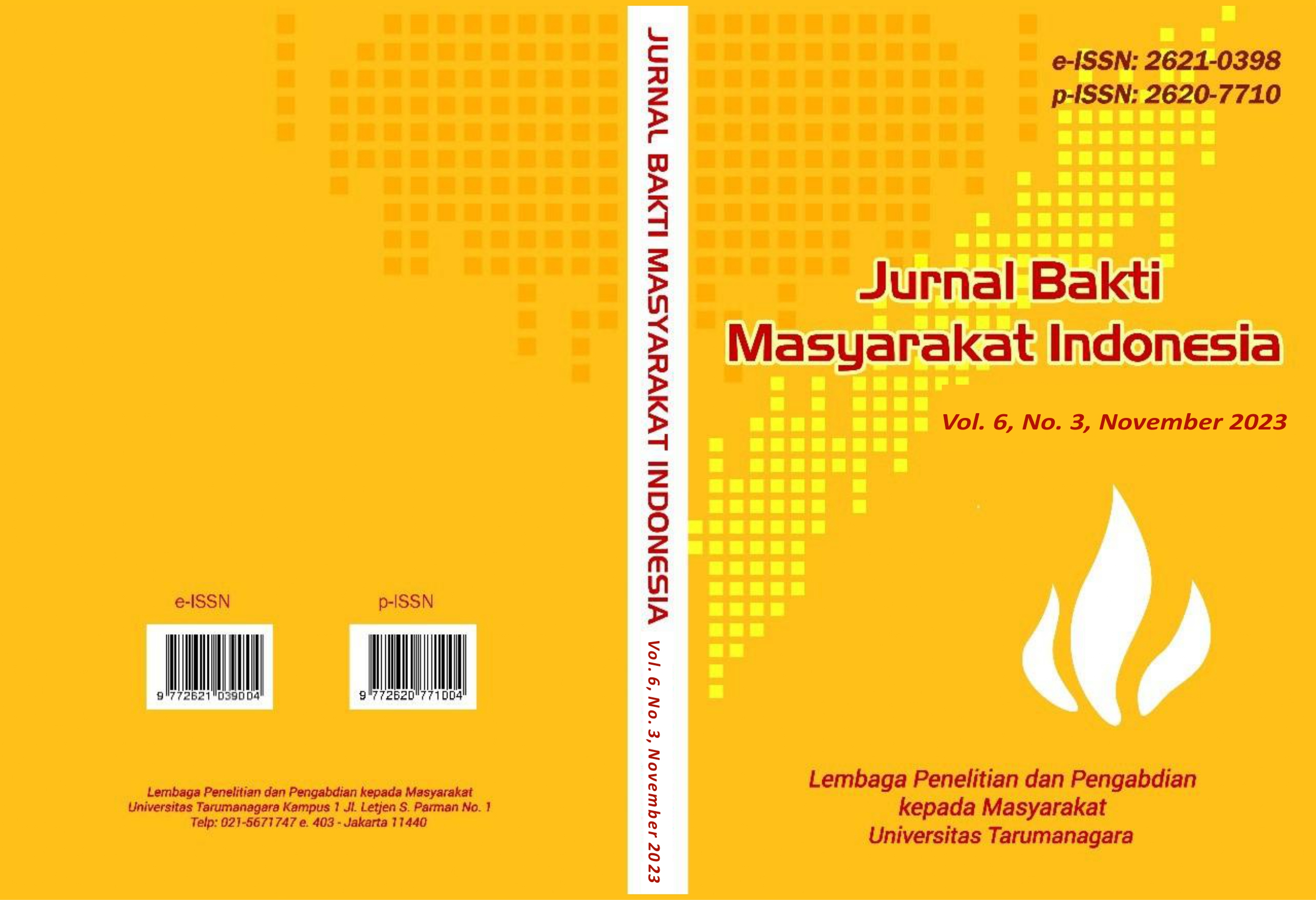PROGRAM PELATIHAN PENGEMBANGAN KOMPETENSI GURU SEKOLAH INKLUSI DI SDN KARAWACI 3 TANGERANG
Main Article Content
Abstract
SDN 3 Karawaci Tangerang is one of the schools designated as an inclusive school. Based on the results of the
needs analysis conducted using observation, study of school documents, interviews, and FGDs with teachers,
principals, education personnel, students, and parents, it was found that one of the main challenges at SDN
Karawaci 3 is the unpreparedness in accommodating the needs of students with disabilities in inclusive schools. This
main problem is caused by dif iculties in identifying students with disabilities in the classroom, teachers' lack of
competence in teaching students with disabilities, inadequate facilities to accommodate students with disabilities,
inef ective communication within the school ecosystem and a lack of discipline consistently applied by the school..
The training program provided aims to improve teachers' competence in teaching in inclusive schools, with the
theme "Introduction to Characteristics, How to Communicate, and Learning Programs for Students with Special
Needs".. The implementation of this training consists of three main sessions, namely Session I discusses the
characteristics of students with disabilities in inclusive schools, Session II discusses ef ective communication
strategies between teachers and the school ecosystem, and Session III discusses how to prepare an Individual
Learning Program (IEP). The training evaluation was reviewed from two aspects, namely evaluation of training
activities and evaluation of the achievement of objectives. In evaluating the achievement of objectives, the facilitator
team looked at the achievement of objectives for each session based on participants' responses during discussions
and the pre-test and post-test results. As a result, some participants experienced an increase in the average score on
the post-test in each session, although the results were not significant.
ABSTRAK:
SDN 3 Karawaci Tangerang adalah salah satu sekolah dasar yang mendapatkan penunjukan sebagai sekolah inklusi.
Berdasarkan hasil needs analisis yang dilakukan dengan metode observasi studi dokumen sekolah, wawancara, dan
FGD kepada guru, kepala sekolah, tenaga kependidikan, siswa dan orangtua siswa, ditemukan bahwa salah satu
tantangan utama di SDN Karawaci 3 ialah ketidaksiapan dalam mengakomodasi kebutuhan peserta didik
berkebutuhan khusus (PDBK) di sekolah inklusi. Masalah utama ini disebabkan oleh kesulitan identifikasi PDBK di
dalam kelas, kurangnya kompetensi guru dalam mengajar PDBK, fasilitas yang kurang memadai untuk
mengakomodasi PDBK, komunikasi yang tidak efektif di dalam ekosistem sekolah, dan kedisiplinan yang kurang
diterapkan secara konsisten oleh sekolah. Program pelatihan yang diberikan bertujuan untuk meningkatkan
kompetensi guru dalam mengajar di sekolah inklusi, dengan tema “Pengenalan Karakteristik, Cara Berkomunikasi,
dan Program Pembelajaran untuk Siswa Berkebutuhan Khusus”. Adapun pelaksanaan pelatihan ini terdiri dari tiga
sesi utama yaitu Sesi I membahas mengenai karakteristik PDBK di sekolah Inklusi, Sesi II membahas mengenai
strategi Komunikasi yang efektif antara Guru dengan Ekosistem Sekolah, dan Sesi III membahas mengenai cara
penyusunan Program Pembelajaran Individual (PPI). Evaluasi terhadap pelatihan ditinjau dari dua aspek, yaitu
evaluasi kegiatan pelatihan dan evaluasi pencapaian tujuan. Dalam evaluasi pencapaian tujuan, tim fasilitator
melihat pencapaian tujuan setiap sesi berdasarkan tanggapan peserta saat berdiskusi, dan hasil dari pre-test serta
post-test. Hasilnya beberapa peserta mengalami peningkatan rata-rata skor pada post test dalam setiap sesi,
walaupun hasilnya belum signifikan.
Article Details
Section

This work is licensed under a Creative Commons Attribution-NonCommercial-ShareAlike 4.0 International License.
This work is licensed under a Jurnal Bakti Masyarakat Indonesia https://creativecommons.org/licenses/by-nc-sa/4.0/
How to Cite
References
Badan Standar, Kurikulum, dan Asesmen Pendidikan Kemendikbudristek. (2022). Kurikulum
untuk Pemulihan Pembelajaran. Pusat Kurikulum dan Pembelajaran.
Creswell, J. W. (2012). Educational research planning, conducting, and evaluating quantitative
and qualitative research (4th ed.). Boston, MA: Pearson.
Darma, I. P., & Rusyidi, B. (2015). Pelaksanaan Sekolah Inklusi di Indonesia. Penelitian dan
pengabdian kepada Masyarakat. Departemen Kesejahteraan Sosial Fakultas Ilmu Sosial
Del Prette, Z. A. P., Del Prette, A., & Peixoto, E. M. (2021). Social Skill Inventory-2 Del-Prette:
Expanding and updating psychometric properties. Estudos de Psicologia, 38, Article
e190124. https://doi.org/10.1590/1982-0275202138e190124
Donnelly, V. (2010). European Agency for Development in Special Needs Education; 2006.
Teacher Education for Inclusion–International Literature Review.
Eccles, J. S. (1999). The development of children ages 6 to 14. The Future of Children, 9(2),
–44. https://doi.org/10.2307/1602703
Maemunah,S. (2021, Juni 30). Cara Berkomunikasi dengan Anak Berkebutuhan Khusus. Diakses
dari
https://ayoguruberbagi.kemdikbud.go.id/artikel/cara-berkomuniksi-dengan-anak-berkebut
uhan-khusus/
McConnell, J. H. (2003). How to identify your organization’s training needs: A practical guide
to needs analysis. American Management Association.
Mukherjee, N., & van Wijk, C. (2003). Sustainability planning and monitoring in community
water supply and sanitation: A guide on the methodology for participatory assessment
(mpa) for community-driven development programs. International Water and Sanitation
Centre.
Mustika Berlinda, L., & Naryoso, A. (2018). Kompetensi Komunikasi Guru Pendamping Khusus
di Sekolah Inklusi. Interaksi Online, 6(4), 411-422. Retrieved from
https://ejournal3.undip.ac.id/index.php/interaksi-online/article/view/21795

